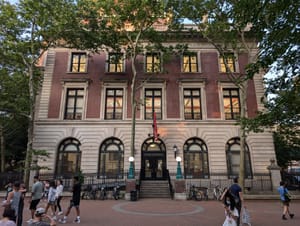I have suggested in these pages that logistics is a central part of what we do. Logistics is about moving information, materials and services through a network cost-effectively. Resource sharing is supported by a library logistics apparatus. The emerging e-resource discovery to delivery chain, tied together with resolution services, is a logistics challenge. Many of the e-resource management issues are like supply-chain management issues. Increasingly, as libraries look at shared solutions for off-site storage, e-resource management, digitization and archiving they run into logistics and supply-chain management questions. They are looking for efficiencies within the system, whether that system is a consortium, a network of suppliers, or some other grouping.
In the last year or two I have spoken to a variety of people about ‘library logistics’; I don’t think that they have been entirely persuaded 😉 That may be about to change …
This is by way of introduction to the significant report Public Libraries: Efficiency and Stock Supply Chain Review, written by PKF consultants and published by the Museums, Libraries and Archives Council and the Department of Culture, Media and Sport in the UK. Check the press release, the report home page and the Executive Summary [pdf].
The report argues that English public libraries need to reorganize themselves to create more value for users in public-facing roles. This should be achieved by taking cost out of the back-office functions through the improvement of system-wide logistics and supply-management functions. There are 149 local authorities in England, each with a respsonsibility to provide the local public library service. Some sample recommendations:
- Standardize the processes through which library authorities meet their goals. For example, standardizing the purchase of books would lead to economies of technical processing and higher discounts.
- Reduce redundancy of effort in stock selection through supplier selection.
- Move to a single cataloguing system.
One might argue with some recommendations, or suggest that some are missing. However, the main import of this report is the strong statement that libraries can remove costs from back-office processing by mobilizing their collective resources at the national level. The standardization and consolidation of processes across authorities should deliver savings.
The Minister for Culture comments:
“For libraries to be able to provide the best possible selection of books they need to purchase them at the most economical cost, and for this they need to adapt their ways of buying. By working together on joint orders and shared systems they could save between ?7m and ?20m that could be spent on more books or on other improvements such as longer opening hours. [Independent report supports single library purchasing agency | eGov monitor]



